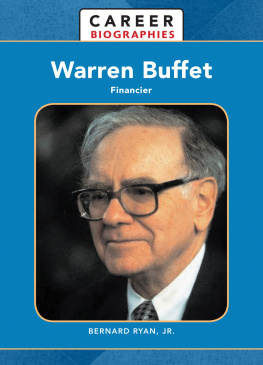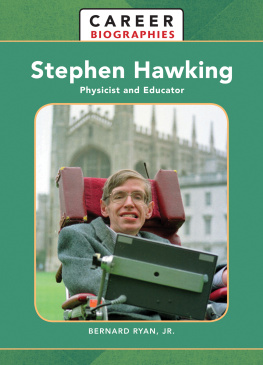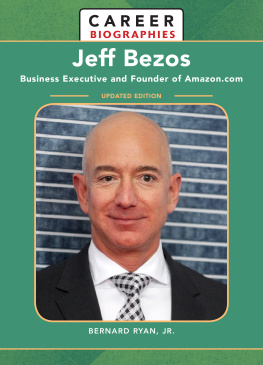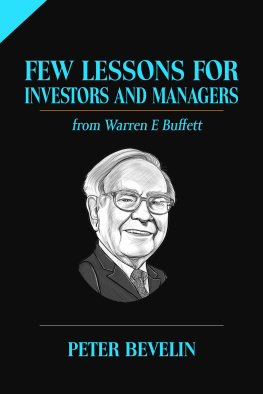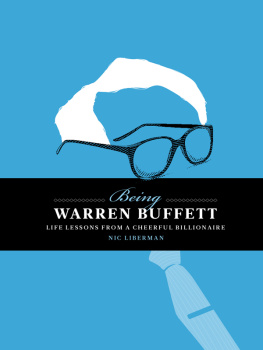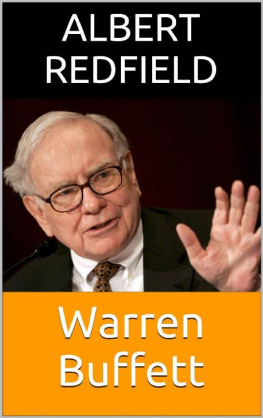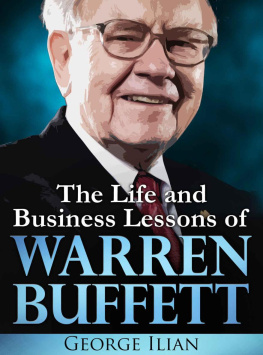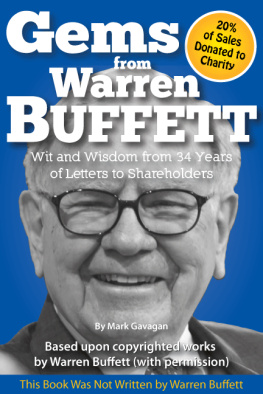Bernard Ryan - Warren Buffett: Financier
Here you can read online Bernard Ryan - Warren Buffett: Financier full text of the book (entire story) in english for free. Download pdf and epub, get meaning, cover and reviews about this ebook. year: 2013, publisher: Infobase Publishing, genre: Detective and thriller. Description of the work, (preface) as well as reviews are available. Best literature library LitArk.com created for fans of good reading and offers a wide selection of genres:
Romance novel
Science fiction
Adventure
Detective
Science
History
Home and family
Prose
Art
Politics
Computer
Non-fiction
Religion
Business
Children
Humor
Choose a favorite category and find really read worthwhile books. Enjoy immersion in the world of imagination, feel the emotions of the characters or learn something new for yourself, make an fascinating discovery.
- Book:Warren Buffett: Financier
- Author:
- Publisher:Infobase Publishing
- Genre:
- Year:2013
- Rating:3 / 5
- Favourites:Add to favourites
- Your mark:
- 60
- 1
- 2
- 3
- 4
- 5
Warren Buffett: Financier: summary, description and annotation
We offer to read an annotation, description, summary or preface (depends on what the author of the book "Warren Buffett: Financier" wrote himself). If you haven't found the necessary information about the book — write in the comments, we will try to find it.
Warren Buffet: Financier tells the life story of one of Americas most respected inves
Warren Buffett: Financier — read online for free the complete book (whole text) full work
Below is the text of the book, divided by pages. System saving the place of the last page read, allows you to conveniently read the book "Warren Buffett: Financier" online for free, without having to search again every time where you left off. Put a bookmark, and you can go to the page where you finished reading at any time.
Font size:
Interval:
Bookmark:
Copyright 2013 by Infobase Learning
All rights reserved. No part of this publication may be reproduced or utilized in any form or by any means, electronic or mechanical, including photocopying, recording, or by any information storage or retrieval systems, without permission in writing from the publisher. For more information, contact:
Chelsea House
An imprint of Infobase Learning
132 West 31st Street
New York NY 10001
ISBN 978-1-4381-4597-6
You can find Chelsea House on the World Wide Web
at http://www.infobaselearning.com
In June 1943, a 13-year-old named Warren Buffett and two of his pals ran away from their homes in Washington, D.C. Hitchhiking, they headed for Hershey, Pennsylvania, where they thought they could get work as caddies at a golf course. That evening they checked into a room in a Hershey inn. The next morning they were questioned by some curious policemen. The boys gave answers that were good enough to send the police away, but they also decided to head back home.
Warren's father was serving his first term as a U.S. Congressman from Omaha, Nebraska. When the Buffett family moved to Washington in January, Warren had been allowed to stay in Omaha with his grandfather and aunt while he finished eighth grade. Now, over the past year, he had completed ninth grade in Washington's Alice Deal Junior High. He had been anything but happy living in Washington, however, and his marks in school had been anything but the grades he was capable of. Yet, over the year, he had built up a good business delivering a morning newspaper, The Washington Post.
Warren's father then gave his son a challenge: Warren could either improve his grades or quit delivering papers.
Warren liked making money. Within a few months, his work in school improved and he expanded his business to cover five newspaper routes and to include the Times-Herald, for customers who did not want the Post. By 1945, he was making $175 a month, equal to the full-time pay of many adult wage that year. In the summer, when he and his family visited Omaha while Congress was not in session, the 14-year-old looked over 40 acres of Nebraska farmland. Spending $1,200 from the savings from his newspaper route, he bought the acreage and began collecting rent from a tenant farmer. Thus started the career of one of the world's most successful financiers and investors.
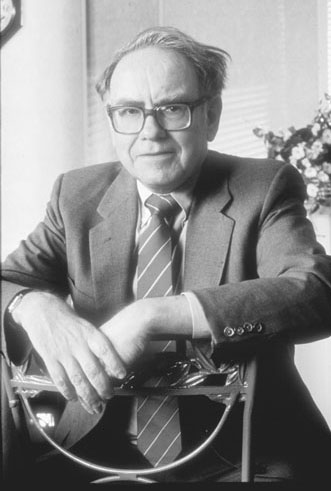
Warren Buffett is one of the world's most successful investors.
Source: Time Life Pictures/Getty Images.
Warren Edward Buffett was born in Omaha on August 30, 1930. His ancestors on his father's side had been French Huguenots who came to America in the 1600s. They had been farmers in the area of Huntington, Long Island, for more than 150 years when one of them, Sidney Homan Buffett, decided to look for a new life out west. It was 1867, just after the end of the Civil War, and the United States was fast stretching westward. Sidney reached the pioneer city of Omaha, a group of log buildings sitting beside the Missouri River and looking across the Great Plains. There he first worked as a stagecoach driver. Then he opened the S. H. Buffett grocery store.
Only three months earlier, the railroad linking east and west had been completed. Omaha was prospering, and the S. H. Buffett grocery grew with the city. By the 1870s, new Omaha settlers, travelers heading west, and railroad men coming and going in both directions all found a bustling city that boasted large cast-iron buildings and even an opera house. All those people had to eat, and S. H. Buffett supplied their hotels, restaurants, and homes with everything from flour and sugar to quail and prairie chickens.
By 1900, Omaha was a city of 140,000 people. Sidney Buffett had not only built a much larger store but had married and produced two sons to join the business. In 1915, one son, Ernest, opened a second store, Buffett & Son, on the city's growing west side, where Omaha's well-to-do were developing pleasant suburban neighborhoods.
Ernest married and had a son named Howard who, when he grew old enough to consider the family business, had a mind of his own. It did not include selling groceries. As a student at the University of Nebraska in Lincoln, he discovered journalism and became editor of the Daily Nebraskan. There he met a country girl named Leila Stahl, whose father owned a weekly newspaper in the small town of West Point, Nebraska. At 16, Leila had just graduated from high school and was looking for a newspaper job where she could earn money needed for college. She offered good skills: Since fifth grade she had worked at her father's paper, setting type by hand and on the Linotype machine (that is, a machine that was operated by a keyboard and that created each line of type as a solid piece of metal). She knew how to conduct and write up interviews, and on Thursdays she operated the printing press as it churned out its sheets of newsprint. Howard hired her and fell in love with her.
They were married on December 26, 1925, in the winter after Howard graduated from college. Although he had wanted to work as a newsman, he accepted a job offered by a friend of his father in an insurance company, for his father had paid for college. That job led to another, in which Howard worked for the Union Street Bank as a salesman of securities (that is, certificates of stocks or bonds proving part ownership of a business).
In 1928, Howard and Leila had a daughter whom they named Doris. Warren arrived two years later on an August day as the stifling 89-degree heat was broken by a cloudburst.
Within a year, just two weeks before Warren's first birthday, his father's bank shut its doorspermanently. The Great Depression, which began in 1929 and which destroyed countless businesses across America, had wiped out Howard Buffett's job and life savings.
Howard came from a long line of determined, thrifty, goal-centered people. He and a partner set up their own business, announcing they had "Investment Securities, Municipal, Corporation and Public Utilities, Stocks and Bonds" for sale. Their income depended on commissions, that is, fees paid as a percentage of the price of whatever they bought or sold for a customer. The commissions were small and infrequent, for Howard and his partner were not well known in the securities business, and Nebraskans, who were suffering from a vast drop in the price of wheat, had little money to invest. Proud farmers, in fact, were humbly accepting free meals in soup kitchens.
At home, Leila Buffett coped with the family's meager income by often going hungry herself so her husband and children could eat full meals. But gradually the family dinner table improved, and the family grew with the arrival of Warren's little sister, Roberta, when he was three. By the time Warren was six, Howard could afford to move his family to a larger home, a roomy brick house on Omaha's North 53rd Street.
Warren had barely started school when his parents began to realize that their son had a mind for money and numbers. As a five-year-old, he set up a stand in front of his home and sold Chiclet chewing gum to whomever passed by. At six, during a family vacation on a lake in Iowa, he discovered he could buy six-packs of Coca-Cola for a quarter. He scurried around the lake selling the Cokes for a nickel each, earning five cents profit per six-pack. Home again in Omaha, he bought bottles of soft drinks from his grandfather's store and spent hot summer evenings going through his neighborhood to sell them at a profit.
Font size:
Interval:
Bookmark:
Similar books «Warren Buffett: Financier»
Look at similar books to Warren Buffett: Financier. We have selected literature similar in name and meaning in the hope of providing readers with more options to find new, interesting, not yet read works.
Discussion, reviews of the book Warren Buffett: Financier and just readers' own opinions. Leave your comments, write what you think about the work, its meaning or the main characters. Specify what exactly you liked and what you didn't like, and why you think so.

